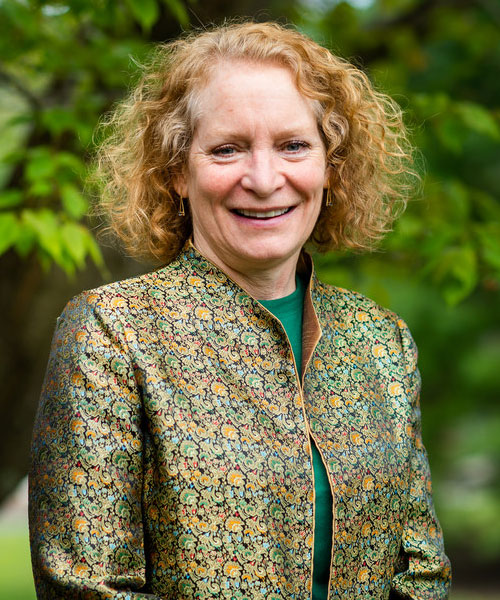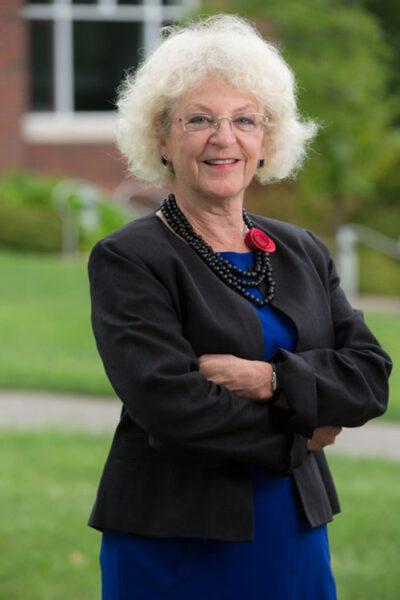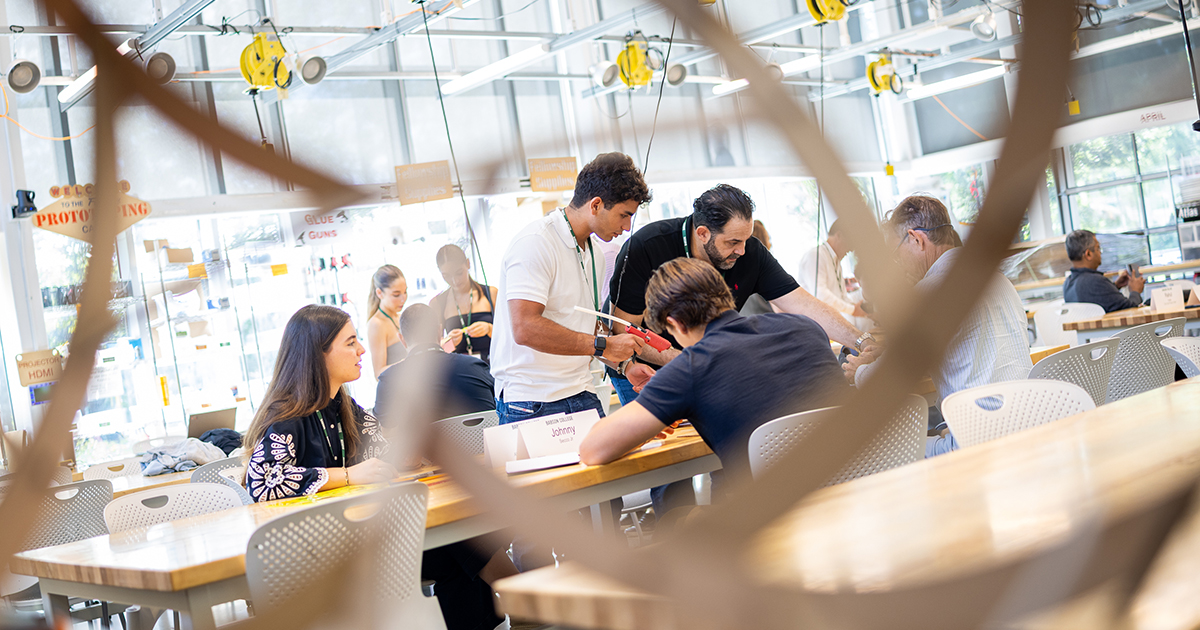U.S. GEM Report: Entrepreneurial Activity Reaches Record Levels

Data matters, and if you have data about a critical driver of economic value and social change, that data is especially important.
The Global Entrepreneurship Monitor, or GEM as it’s commonly called, is just such a source of critical data. Since 1999, when it was established as a joint venture of Babson College and the London Business School, it has examined entrepreneurial activity around the world.
Today, GEM released its 2022–2023 United States Report, which found that entrepreneurial activity in the U.S. continues to rise, reaching its highest levels in GEM history, with rates of 18% for women and 20% for men, both records. “It’s remarkable to see this record-breaking entrepreneurial activity,” says Donna Kelley P’24, U.S. GEM team co-leader and chair of Babson’s Entrepreneurship Division.
This year’s report also found a high entrepreneurial rate among young people, who are often driven by social and sustainability concerns, and a growing rate of entrepreneurship in the manufacturing sector, particularly among women.

Donna Kelley P’24, U.S. GEM team co-leader and chair of Babson’s Entrepreneurship Division
All of this activity can have a profound influence on our daily lives, Kelley says, as entrepreneurs “are not only reshaping the business landscape, but also propelling significant social and environmental advancements.”
These far-reaching effects underscore exactly why the GEM data is so essential. The data serves as a window into understanding a potent force, and it can be used by academics and policymakers to further investigate entrepreneurial activity and see how they can encourage it across all sectors and populations.
“Think about how entrepreneurs impact society,” says Kelley, also the Frederic C. Hamilton Professor of Free Enterprise Studies. “We want entrepreneurship to be accessible to everyone.”
A Push Toward Manufacturing
Polling more than 2,000 U.S. adults in the summer of 2022, this year’s GEM report shows a continuing upward trend in entrepreneurial activity. That trend began in 2015 and only saw a brief downturn during the first year of the pandemic. In the U.S., Kelley says, entrepreneurship remains something that’s celebrated. “It is seen positively,” she says. “It is supported by many conditions and factors in the economy.”

Candida Brush P’14, the F.W. Olin Distinguished Professor of Entrepreneurship
That being said, the GEM report helps to dispel assumptions that many may have about entrepreneurs in the U.S. “If you ask someone what a typical entrepreneur is, they’ll say a tech entrepreneur,” Kelley says. “That’s not the case. We may celebrate more those who do tech, but there are many types of entrepreneurs. We need to understand that all entrepreneurs are important to the country.”
One of the more interesting findings in the report, for instance, shows an entrepreneurial shift away from industries such as finance, real estate, and business services toward manufacturing and logistics (rates of which increased from 12% in 2020 to 19% in 2022). This shift may be attributed to the pandemic, says U.S. GEM team co-leader Jeffrey Shay ’87, MBA’91, which exposed the country’s dependence on foreign countries to produce goods, as well as frustrating problems with the supply chain.
“The amplified interest in logistics could be traced back to the extensive media coverage highlighting the logistical predicaments witnessed in the USA during the pandemic, such as the sight of countless container ships idling at ports,” says Shay, professor of entrepreneurship and the executive director for academic operations at the Arthur M. Blank School for Entrepreneurial Leadership.
This push toward manufacturing is powered by women, with nearly 18% of women surveyed beginning ventures in manufacturing, a rate twice that of men. Candida Brush P’14, a co-author of the report along with Kelley and Shay, says this movement by women toward manufacturing may be representative of a change in mindset.

Jeffrey Shay ’87, MBA’91, U.S. GEM team co-leader and professor of entrepreneurship
“Since COVID, there’s been a shift in how women are thinking about entrepreneurship,” says Brush, the F.W. Olin Distinguished Professor of Entrepreneurship. “Instead of focusing on low-entry barrier and low-margin local companies like service businesses, they’re creating businesses to make a difference in the world. In doing so, women are starting manufacturing, wholesale, and retail businesses on a larger scale. We didn’t see this same shift for men.”
Kelley is curious if this manufacturing uptick will continue. “Is this a one-year blip? Did the pandemic affect it, or is this a long-term effect?” she says. “You get these surprising results, and you can’t wait till next year to see if it’s still happening.”
To Make People Think
The GEM report is more than just an exercise in data collection. The rich and extensive report is meant for researchers, community and business leaders, and others to utilize. “We do research that has impact,” Kelley says. “We are creating good empirical data for decision making and determining actions. My hope is we get many people thinking.”
One area of concern that demands more thought, for example, is the GEM report’s finding on Black and Hispanic entrepreneurs. Of all the racial groups surveyed, Black people had the highest rate of entrepreneurial activity (35%), followed by Hispanic people (27%). White people, meanwhile, reported a much lower rate of 15%.
Despite these high rates for Black and Hispanic entrepreneurship, however, they remain less likely to run established businesses than white entrepreneurs. That finding begs the question: What happened to all the businesses that Black and Hispanic entrepreneurs began? Are they not receiving the support needed to mature into more established businesses?
“We do research that has impact. We are creating good empirical data for decision making and determining actions. My hope is we get many people thinking.”Donna Kelley, the Frederic C. Hamilton Professor of Free Enterprise Studies
“Are the factors important to entrepreneurship accessible to some groups in society more than others?” Kelley says. “This is something we need to continue tracking. It is really important.”
It’s important because entrepreneurs have the ability to shape the lives of themselves and their families, not to mention the trajectory of their communities and the world. The GEM report finds that many entrepreneurs are thinking of the effect they can make beyond themselves. Among entrepreneurs, for instance, 56% of women and 62% of those 18 to 34 have taken steps to minimize their venture’s negative environmental effects.
“They’re not just doing it for the money. They want to have an impact on the world,” Kelley says. “Being an entrepreneur, you can really make a difference.”
GEM’s data is helping entrepreneurs to make that difference. “Through initiatives like GEM,” says Babson President Stephen Spinelli Jr. MBA’92, PhD, “we gain valuable insights from entrepreneurs and provide them with guidance as they shape the trajectory of tomorrow’s world.”




